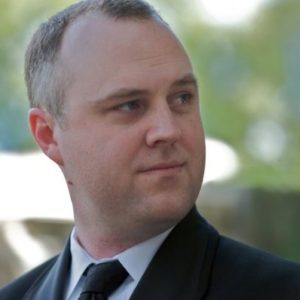Dustin Guest
What once took days, now takes hours because of the digital asset management implementation Dustin has incorporated at the Golf Channel.
What companies/organizations have you worked for as a DAM professional? What was your role at each?
Asset management has been a primary component of my role here at Golf Channel for about 8 years now. I worked as an offsite coordinator for the Library, and that experience combined with my knowledge of Avid editing systems got me my first Asset Management job within the company as the Media Content Administrator.
From there I was promoted to the Post Supervisor role where I was responsible for both managing the Post processes as well as the media on the Digital Asset systems. From there I was promoted and started a brand new department that was tasked with operating and maintaining the DAM system that we implemented here. I oversee 15 people in the department and we operate 24/7 moving media into and out of archive for our production departments.
How do you describe digital asset management to others?
It’s kind of a combination of Computer Science, Library Science, and in my environment, Assistant Editing. We have to understand how all of these components fit together, so that the media that we are archiving is both usable and retrievable when a client eventually wants to find it.
How did you learn DAM? Any recommended sources?
I’m primarily self-taught based on the unique situation that we found ourselves in. We actually started fairly early in creating an end-to-end digital workflow, so in many cases we had to learn as we went. This meant breaking a lot of things along the way, but it also meant that I had a much better understanding of the pitfalls that you can get into when you make these kinds of migrations.
What’s the most important thing for someone new to DAM to understand about DAM?
Your database and metadata are almost more important than the media itself. You can have the best media in the world, but it means absolutely nothing if you can’t find it. Computers allow you to do a lot of powerful things, but they can’t make up for good solid data.
If you weren’t doing DAM as a career, what would you be doing?
Probably video editing or cinematography in some capacity. I still enjoy doing those tasks, even if I don’t get to very often.
What is your ongoing greatest challenge with DAM?
Search. We tend to find that users find search in these databases to be confusing, and there’s a lot of frustration on their part. Federated search, fuzzy logic, and boolean all help, but there seems like there is still some way to go in terms of getting solid usable results for the user.
What is your vision for DAM? What will it look like in 5 years?
My guess is that a lot of this is going to end up cloud based and device agnostic. It’s also likely that a lot of new features like OCR, natural language interpretation, and digital voice recognition for logging are going to become more common. I see a high likelihood that, especially for media businesses, DAM is going to become central to the overall business process, with other functions tied into and feeding information to the central DAM repository. I can see functions like programming, closed captioning, scheduling, and commercial traffic all being connected.
What was your biggest mistake with regard to DAM?
We should have made a clean break from the past and leveraged our DAM system based on how it was designed. We implemented a number of processes to emulate old workflows to help try and make the transition easier for the users, but it ends up hamstringing the ability to use the system more fluidly. It wasn’t system breaking, but it means that you have to think very carefully about how you implement new workflows to make sure you aren’t going to break one of your older processes.
What was your biggest success with regard to DAM?
Our end-to-end digital workflow has been a massive success. We can now do in a few hours what used to take a day or more when retrieving material. Users can preview footage before retrieving it, saving them from headaches in edit. It was a difficult transition, but at this point I don’t think that anyone can argue in favor of the past.
This interview originally appeared on DAM Guru on Mon, 20 Apr 2015. For more DAM News interviews, see the interviews index page.
Share this Article:

